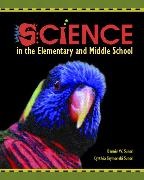Read more
This exceptionally clear and logically organized new entry far science methods has its foundation in constructivism and inquiry, the fundamental approach of the National Science Education Standards. Each chapter is structured as a learning cycle of exploration, invention, and expansion, beginning by bringing out readers' prior knowledge in the Exploring Your Ideas feature, followed by an explanation involving concrete examples, and concluding with the application of new ideas to several classroom situations. 't-his structured approach benefits new users of inquiry by guiding the development of effective inquiry-teaching strategies.
Features of This Text:
- Applying What you Know activities give users opportunities to practice, apply, and reflect upon ideas from the textbook in planning and classroom settings.
- Classroom Scenes and Sample Lesson Plans facilitate readers' construction of meaningful science lessons, units, and yearlong programs.
- Starting Points are extraordinary chapters far beginners teaching physical, biological, and earth and space science concepts, which cover ways of determining students' prior knowledge, understanding alternative conceptions, and developing conceptual change strategies to develop meaningful science learning.
- Highlighted Notes link readers and instructors to current science education resource websites referencing content explanations, sample lesson plans, teachers' websites, and information from government agencies.
- Companion Website provides a portal to the worldwide science community, with self-assessments, ESL materials, and other science resources.
List of contents
1. What Is Effective Science Teaching?
2. Students' Conceptions of the World: The Origin of Science Ideas.
3. The Learning Cycle.
4. Science as Inquiry.
5. The Content of Science: Conceptual Learning.
6. The Content of Science: Constructing Generalizations.
7. Teaching Science Meaningfully.
8. Assessing and Evaluating Science Learning.
9. Planning Science Units.
10. Science for All Students.
11. Developing an Effective Classroom Science Program.
12. Starting Points in Teaching Science.
13. Physical Science Starting Points.
14. Biological Science Starting Points.
15. Earth and Space Science Starting Points.
Glossary.
References.
Name Index.
Subject Index.
Summary
For courses in Elementary and Middle School Science Methods.
This exciting new text for science methods has its foundation in the National Science Standards and constructivist teaching. Chapters are built around the learning cycle of exploration, invention, and expansion, and the role of thinking skills in students' meaningful construction of science knowledge. Every chapter begins with Exploring Your Ideas, in which readers bring out their prior knowledge as they consider a problem. Then, the reader is guided through an explanation involving concrete examples and practice opportunities that develop knowledge and skills. Finally, discussion and examples of the topic help readers apply new ideas to classroom situations.

